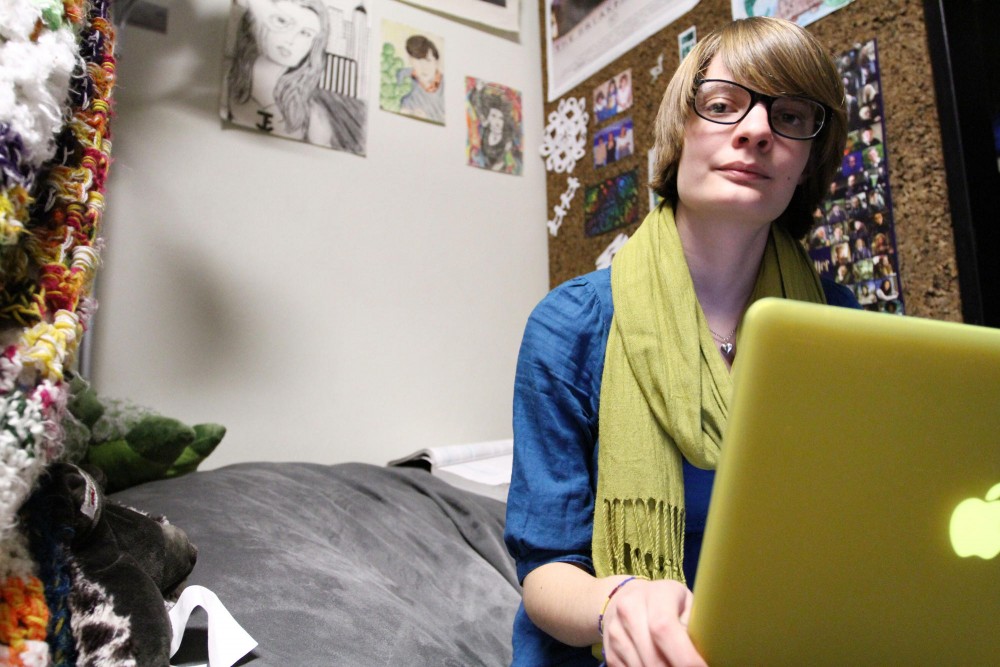It starts with a hollow ache in her chest, and then the irritability sets in. When the anxiety becomes unbearable, Julia Walchuk feels like she’s in a glass box. Everything around her sounds muffled.
The University of Minnesota freshman said she’s dealt with these episodes her entire life, but with the increased stress of her first year of college and getting dumped by her boyfriend, Walchuk’s anxiety spun out of control.
She went to Boynton Health Service two weeks ago for an Urgent Mental Health Consultation to discuss her overwhelming emotions.
Walchuk is one of Boynton Mental Health Clinic’s 1,826 patients since the beginning of fall semester — a demand that continues to grow year after year.
Both Boynton and the University police, which respond to crisis calls, have seen an increase in the number of students struggling with mental health issues.
Crisis intervention calls — when police respond to mental health situations that require immediate attention — increased by 34 calls from 2009 to 2010. Part of that increase was because more officers are correctly filing the incidents as crisis interventions, University police Chief Greg Hestness said.
University police responded to seven suicide attempts last year and one suicide, Hestness said.
Police responses to students experiencing mental health crises can include transporting them to a crisis center for further evaluation, University police Deputy Chief Chuck Miner said.
“With all the stressors in the life of a college student, there seems to be an increase in students being in mental health crisis,” Miner said.
Miner, who writes daily summaries of police activity on campus, has been writing more summaries of students experiencing a mental health crisis. He said that police see even more calls near the end of semesters because of the additional stress.
About 25 percent of University police officers are trained to handle these situations by the Minnesota Crisis Intervention Team, Hestness said.
The Minnesota Crisis Intervention Team is a 40-hour program that trains officers in advanced mental health awareness, communication techniques and the skills to help deal with people having a mental health crisis.
“These things happen around the clock and we don’t really have a mobile team of psychologists and psychiatrists to respond to all of these scenarios,” Hestness said.
Since police are usually the first to respond to the call, Hestness said they need to have knowledge about mental health and how to de-escalate situations.
A ‘helpful’ collaboration
University police work with the Boynton Mental Health Clinic to handle at-risk students, said Boynton therapist Candice Price, who is primarily responsible for the clinic’s urgent counseling.
Price says that demand for urgent counseling, which provides students with immediate mental health support, has been substantial.
The clinic involves the University police when they encounter students who need to be hospitalized but aren’t willing to go voluntarily, Price said.
University police also bring students to the clinic when they come across students who are emotionally upset and may need somebody to talk to, Price said.
When students miss appointments at the mental health clinic and there is a concern for their safety, the clinic will call the police to check on the student and assess whether there is an urgent mental health concern.
“They have been very helpful to us,” Price said.
In addition to seeking mental health support at Boynton, Active Minds is an awareness and outreach student group that works to show students the available mental health resources the campus has to offer. The group’s student adviser Will Menzel called Active Minds a “safe haven” for students to talk about mental health.
Menzel, a 2010 University graduate, joined the group four years ago as a way to be excited about mental health, as well as a way to cope with his mother’s suicide a year earlier.
“The positive energy is really something I appreciate about Active Minds,” Menzel said.
A continued increase in demand
Over the last year, the clinic has seen an “incredible increase” in students looking to get medical care, Boynton Mental Health Clinic director Gary Christenson said. There was an 8 percent increase in the number of services the clinic delivered over the last year.
This increase has become a pattern that the clinic has seen year after year throughout the last decade, Christenson said.
“Last year we added some more staff, but even this year, once again our resources are getting pressed,” Christenson said.
Christenson says the clinic may have to increase staff once again to keep up with the demand.
Although the clinic has seen an increase in service, Boynton surveys show there has not been an increase in depression and anxiety among students. Christenson said that a decreased stigma surrounding mental health care might be one contributor to the increase in students seeking help.
More students with mental health concerns have become willing to take advantage of what the mental health clinic has to offer and there is an earlier recognition of health issues, he said.
Two weeks ago, Walchuk became one of the many students who received mental health support at Boynton.
Though she said she’s had panic attacks on and off ever since she was in fourth grade, she never understood what was causing her episodes of hyperventilation.
At Boynton, she was diagnosed with Generalized Anxiety Disorder — a common disorder that induces higher anxiety and increased panic attacks and irritability.
Walchuk said she’s working with the clinic to learn how to handle these episodes without medication, so she can “truly be in the moment and truly have fun.”









